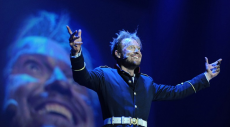
Chapter seven serves to convey society’s ceaseless influence upon the narrator; ‘My terror had fallen from me like a garment. My hat had gone, and my collar had burst away from its fastener.’ The expectations of society are so deeply imprinted upon the narrator, that he is not even thinking about the numerous murders he has just witnessed, and narrowly escaped from himself, but rather, he is worrying about his appearance, going so far as to place his hat falling off on the same level as the terror he felt as the Martians roasted people to their deaths. I think Wells included this to test the reader; would they have images of burning bodies penetrating their minds, or would they be more anxious over the narrator’s outward appearance being socially acceptable? Later, in, ‘How I reached home,’ we see more stereotypical speech, representative of the lower class; ‘What’s it all about?’ and three members of the public laugh at the narrator, as a result of his clothing situation, evidently believing him to be crazy, as he has lost his hat, very much like Ogilvy in chapter two, who is also trying to convince people that there are Martians, to no avail, for the same reason.
Before the climax of the chapter, Wells creates another reference to evolution; ‘So some respectable dodo in the Martians might have bided it in his nest, and discussed the arrival of pitiless sailors in want of animal food, “We will peck them to death tomorrow, my dear.” In using dodos in this comparison, the audience would be particularly affected, knowing that we as a species caused the dodos to become extinct, making the link that the Martians have the same power over us, yet we remain ignorant, believing we are still superior, safe, controlling the world, when it is quite the opposite; we are at the mercy of creatures far more advanced than ourselves.
Chapter eleven introduces another main character – the Artilleryman – to us, who is Wells’ way of representing the working class. At first, the common, negative view of the lower class is still portrayed, as the narrator has to almost tell him what he is doing, for him to realise himself; ‘Are you trying to hide?’ ‘That’s it.’ This shows us that the Artilleryman is evidently in shock, which would have been thought upon as weak, especially as he is supposed to work in an area involving weapons, danger, and deaths, every day perhaps. ‘They wiped us out – simply wiped us out,’ reinforces the reader’s view of this character, almost encouraging them to believe their opinion of the working class being beneath them, which is particularly clever of Wells, as it subsequently impacts upon the audience far more when the Artilleryman is discovered to be very intelligent, thus aiding Wells in demonstrating socialism.
Image: http://waroftheworlds.wikia.com/wiki/Artilleryman

0 Comment:
Be the first one to comment on this article.